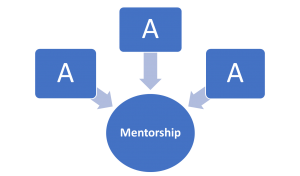Leading In A VUCA World
 There’s no doubt about it, we’re living in a VUCA world. Although it sounds like something out of a science-fiction movie, VUCA stands for volatility, uncertainty, complexity and ambiguity. And it’s become even more pronounced over the past few years. What’s also becoming clear is that strong management within organizations is more vital than ever and comfortable, classic models of leadership don’t work within our ever-changing climate.
There’s no doubt about it, we’re living in a VUCA world. Although it sounds like something out of a science-fiction movie, VUCA stands for volatility, uncertainty, complexity and ambiguity. And it’s become even more pronounced over the past few years. What’s also becoming clear is that strong management within organizations is more vital than ever and comfortable, classic models of leadership don’t work within our ever-changing climate.
So, what does it take to lead in a VUCA world? It takes a lot of effort, but here are some of the top ways to navigate the waters:
- Developing shared purpose and communicating it effectively: Leaders need to be skilled at building teams that have a shared vision. They must also be adept at helping team members understand their place within the big picture. Communication is key!
- Learning to move out of a comfort zone: The old ways of doing things may have worked in the past, but it doesn’t mean they’re going to work forever. Leaders must be open to change and embrace a fresh and creative approach to tackling challenges.
- Having the confidence to lead through times of uncertainty: Times of change can be difficult to handle and managers feel it as much as their team members (maybe even more!). However, strong leaders must be able to assess available information, risks, etc. and take strong, confident action based on their knowledge.
- Providing consistent support: This includes: mentoring team members to help them adjust to changes, modeling the desired behavior for embracing changes, providing and supporting employee learning and development and acknowledging and celebrating successes!
In today’s constantly changing world, leaders may feel like they need to step up their game to be as effective as possible. However, it can be intimidating
to take the first steps towards meaningful and sustainable action. Leaders don’t have to go it alone. Working with a coach, like Leah M Joppy and Associates, provides managers with a partner that can help them navigate our VUCA world. We work with leaders to develop the competencies outlined above and to survive and thrive in a VUCA climate. We also help leaders develop high levels of resiliency, so they’re ready to take on challenges and are less likely to experience burnout.
Call Leah M Joppy and Associates at 301-670-0051 or email leah@lmja.com to learn how we can help.
A Word For An Unsettled Environment
 Chances are, you’ve probably heard or read the acronym ‘VUCA’ (Volatility, Uncertainty, Complexity, Ambiguity) thrown around a time or two. It’s one of those buzz-worthy terms to describe the unsettled environment organizations have to deal with on a daily basis. And nothing has brought out VUCA more than the past few years, as organizations have dealt with unprecedented changes in day-to-day operations and had to pivot in unexpected ways.
Chances are, you’ve probably heard or read the acronym ‘VUCA’ (Volatility, Uncertainty, Complexity, Ambiguity) thrown around a time or two. It’s one of those buzz-worthy terms to describe the unsettled environment organizations have to deal with on a daily basis. And nothing has brought out VUCA more than the past few years, as organizations have dealt with unprecedented changes in day-to-day operations and had to pivot in unexpected ways.
The acronym ‘VUCA’ was first used in 1987 by the U.S Army War College to describe the unfortunate situation after the Cold War. The term later found its way into the business world and outlines four distinct challenges that leaders face:
Volatility: Challenges are unstable and unexpected. The duration of these challenges is unknown.
Uncertainty: The future is unpredictable. It’s nearly impossible to anticipate events and how they’ll unfold.
Complexity: Information is overwhelming and choosing a single right path is almost impossible. Challenges and their repercussions are more complex and harder to understand.
Ambiguity: Situations are vague and difficult to interpret.
In short, we’re living in a world that’s constantly changing and these changes, whether big or small, are happening faster and faster and in more unpredictable ways. Since we don’t have a crystal ball to see the future, the best way for an organization to be prepared is through strong leadership. As we saw over the past few years, change can be incredibly challenging for team members with people reacting to these changes in different ways. Skilled, prepared leaders are the key to meeting the challenges of VUCA head-on through:
- Maintaining strong lines of communication
- Keeping employees engaged
- Determining fresh and creative approaches to meet changes head-on
- Maintaining and growing productivity
And that’s just the start. It’s a tall order for even the most seasoned leader and one where they’ll need a strong level of support from upper management.
As much as we’d like to make time stand still for a bit and catch our breath, change and the challenges that accompany it, is inevitable. We don’t know exactly what changes are coming down the road, but working with a coach, like Leah M Joppy and Associates, can help your organization be prepared when they do happen. We can take a look at what challenges your organization has faced in the past, how your leadership team handled them, what worked and what didn’t. We can then work with you to improve approaches and develop creative and flexible solutions that will help make this VUCA world we’re living in a little more manageable.
Interested in learning more? Call us at 301-670-0051 or email leah@lmja.com.
When Managers Resign
 Here’s a startling number: more than 25 million people quit their jobs in the second half of 2021. It’s why the term “Great Resignation” was born. Of course, not all of these 25 million people were in management roles within their organization, but the “Great Resignation” has certainly impacted leadership positions. Whether managers have chosen to retire or jump ship for green pastures, when the leadership of an organization is impacted, it has a ripple effect that can last for quite a while.
Here’s a startling number: more than 25 million people quit their jobs in the second half of 2021. It’s why the term “Great Resignation” was born. Of course, not all of these 25 million people were in management roles within their organization, but the “Great Resignation” has certainly impacted leadership positions. Whether managers have chosen to retire or jump ship for green pastures, when the leadership of an organization is impacted, it has a ripple effect that can last for quite a while.
Last month, we looked at why mentorship is so vital in cultivating future leaders. But what about retaining the management team you have in place now? They say that employees don’t leave organizations, they leave their managers. But why do managers resign? What causes someone who has ascended to a leadership position to decide to leave? These are a few of the top reasons:
- They don’t have the resources they need to get their job done: Managers may lack technological tools and support, administrative assistance, flexibility in their schedule, etc.
- They don’t feel supported: Managers can often feel overloaded trying to support everyone else. But who is supporting them? Who do they turn to in times of crisis?
- They feel like they’re being micromanaged: If managers feel like they lack autonomy and their ability to lead is being stifled, it can lead to lack of engagement, doubt in their abilities, anger and stress.
- They lack the training to be as effective a leader as possible: Inadequate leadership training can lead to a host of issues for both managers and team members.
- They don’t see growth: Some managers are content to stay in their role until retirement, while others may want a different path because they are bored and don’t feel challenged.
If you’re having an issue with manager turnover or just want to get a jump on any potential issues before they become a problem, working with a coaching firm like Leah M Joppy and Associates is extremely helpful. We provide a fresh perspective and unbiased approach and work with you to identify current and potential issues. We also provide the training and support needed to make managers feel valued and ready to build a strong, more effective team. Call us at 301-670-0051 or email leah@lmja.com to learn more.
Keeping Your Managers In Place
 When it comes to workplace satisfaction, employees continually rate “strong leadership” among one of the most important factors. Your management team is an integral part of your organization, but are you doing everything you can to support them and ensure that they have the necessary tools to lead effectively? In our last article, we looked at a few of the reasons why managers leave their jobs for other opportunities. What can organizations do to reduce turnover among managerial positions and keep current managers engaged? Here’s a look at a few suggestions:
When it comes to workplace satisfaction, employees continually rate “strong leadership” among one of the most important factors. Your management team is an integral part of your organization, but are you doing everything you can to support them and ensure that they have the necessary tools to lead effectively? In our last article, we looked at a few of the reasons why managers leave their jobs for other opportunities. What can organizations do to reduce turnover among managerial positions and keep current managers engaged? Here’s a look at a few suggestions:
- Provide adequate training: Some people are born leaders, but most need training and support when they’re in a managerial role. However, managers are often last in line when it comes to training and development. And it’s one of the biggest mistakes organizations can make. There are all kinds of beneficial training for managers, from honing their soft skills to methods for delegating more effectively and increasing productivity, to name a few.
- Monitor stress: The past few years have been particularly stressful for workers and managers are no exception. They’ve probably been trying to manage the anxiety and stress within their team, but they also need someone in their corner. Regular check-ins, encouraging open and honest feedback and providing flexibility to create work/life balance can really go a long way.
- Give regular feedback and praise: Consistent conversations about performance need to take place at all levels of an organization and that includes managers. Give praise where praise is due and provide constructive feedback on areas that could use improvement. Make sure managers are in the loop about future plans, so they understand where to place their priorities.
- Have regular career conversations: Managers who see opportunities for progression and a career path are more likely to be happy and engaged. If you can show them how their role might develop over time, they will continue to bring enthusiasm to the job.
If it sounds like a lot, don’t worry. That’s where working with a coach, like Leah M Joppy and Associates, can really help. We get to know your organization, your management team and help develop a plan to combat any issues head-on. We can also help develop training programs that tackle a variety of subjects.
Leah M Joppy and Associates is ready to work with your managers to not only increase job satisfaction, but ensure they feel supported in their role. It’s an investment that will pay off in increased loyalty and lower turnover. Call us at 301-670-0051 or email leah@lmja.com to learn how we can help.
The Three “A”s of Mentorship
 According to a CNB/SurveyMonkey “Happiness Workplace Survey,” about half of workers say they have a mentor at work and having that mentor leads to a higher level of happiness in the workplace. In fact, a whopping 91% of workers who have mentors reported feeling “satisfied” with their jobs. And for those who don’t have a mentor? The numbers drop by double digits.
According to a CNB/SurveyMonkey “Happiness Workplace Survey,” about half of workers say they have a mentor at work and having that mentor leads to a higher level of happiness in the workplace. In fact, a whopping 91% of workers who have mentors reported feeling “satisfied” with their jobs. And for those who don’t have a mentor? The numbers drop by double digits.
There’s no doubt that mentorship is a powerful tool. But what are some of the traits that make a great mentor? In our last article, we looked at how a strong mentorship program can benefit an organization. Now, let’s take a deeper look at what’s involved in the mentorship process and some of the fundamentals. That starts with the three “A”s: active listening, availability and analysis.
Here’s a closer look at each:
Active Listening
Strong mentors knows when to stop talking and really listen to what the mentee is saying. They understand how to guide the conversation by asking open-ended, exploratory questions. They also offer quality feedback and often refrain from offering solutions or advice, allowing the mentee to come to their own conclusions and decisions.
Availability
Effective mentors make themselves available through both physical availability and emotional availability. Physical availability refers to scheduled sessions where the mentor offers their full attention and concentration. Emotional availability doesn’t mean a shoulder to cry on, but rather the feeling of care and investment that the mentor puts out (body language, active listening, professional conduct, etc).
Analysis
Effective mentors understand the importance of answering questions and concerns honestly and with diplomacy. In short, they don’t beat around the bush. They know how to help mentees see issues from a different perspective, even if it’s not what they want to hear. That’s why it’s so vital that mentors be up-to-date on current issues and concerns within their industry and know how to modify their analysis based on the latest data.
A great mentor should have a mentees best interest at heart and be able to give quality time and attention to the process. It’s can be a challenging role, but with the right investment and training, a mentor can go from so-so to exceptional. That’s where coaching can be an invaluable asset. Leah M Joppy and Associates can work with you to build a mentorship program within your organization that will not only increase job satisfaction, but will help cultivate a pool of future leaders. Call us at 301-670-0051 or email leah@lmja.com to learn how we can help.
Building Employees’ Skills Through Mentorship
 It’s no secret that a strong mentoring program helps separate good organizations from great organizations. Your team members are your greatest asset, but the past few years have challenged even the most engaged and productive employees. Organizations are starting to reexamine their strategies and develop innovative measures to build employees’ skills, improve engagement and cultivate a pool of future leaders. A well-developed and executed mentorship program is a highly effective tool for accomplishing these goals.
It’s no secret that a strong mentoring program helps separate good organizations from great organizations. Your team members are your greatest asset, but the past few years have challenged even the most engaged and productive employees. Organizations are starting to reexamine their strategies and develop innovative measures to build employees’ skills, improve engagement and cultivate a pool of future leaders. A well-developed and executed mentorship program is a highly effective tool for accomplishing these goals.
Here’s a look at 4 ways mentoring can benefit your organization:
- Develop new managers: It’s essential to grow your potential management pool from within rather than spend more money recruiting from the outside. Mentorship has been shown to increase team members’ confidence, knowledge base and increase the skills needed to succeed for rising managers.
- Retain your high potential employees: According to studies, your high potential employees work 21% harder than their peers and bring 91% more value to the organization. Investing in a mentoring program gives these team members the long-term support they need and encourages them to stay.
- Strengthen your organization’s culture: Committing to the development of your team members pays off with improved engagement, productivity, retention and makes employees feel like you care about their growth. And that leads to a strengthened culture that makes your organization a great place to work!
- Increase knowledge sharing: What happens when people with different ways of thinking and backgrounds come together to share ideas? Increased collaboration, which in turn can lead to increased productivity and innovation. That’s a win-win for both your team members and your organization.
All of this sounds great, but how does your organization get started or improve on what you already have? It’s a big commitment and you want to make sure you’re going to see results. An experienced coach, like Leah M Joppy and Associates, can work with you through every step of the process. We can assess what (if any) mentorship program you currently have in place, make suggestions for changes and build effective mentors that will cultivate future leaders in your organization.
A growth-centric mentorship program is an investment, but it pays off in great dividends. Employee growth inevitably leads to organization growth. Ready to get started? Leah M Joppy and Associates is ready to help. Call us at 301-670-0051 or email leah@lmja.com to learn more.
Leading Through Executive Changes
 Change is an inevitable part of life – and especially the workplace. But that doesn’t mean change is easy and that there won’t be challenges when helping team members navigate organizational or executive transitions within a department. That’s where strong leadership from management makes the difference. All too often, departments are so caught up in the upcoming changes that they don’t think enough about their most important asset – their team members. According to a Gartner study, 73% of change-affected employees report experiencing “moderate to high stress levels”. Those suffering change-related stress “perform 5% worse than the average employee”.
Change is an inevitable part of life – and especially the workplace. But that doesn’t mean change is easy and that there won’t be challenges when helping team members navigate organizational or executive transitions within a department. That’s where strong leadership from management makes the difference. All too often, departments are so caught up in the upcoming changes that they don’t think enough about their most important asset – their team members. According to a Gartner study, 73% of change-affected employees report experiencing “moderate to high stress levels”. Those suffering change-related stress “perform 5% worse than the average employee”.
Without strong leadership, there can also be some unforeseen consequences for departments when organizational and executive changes are on the horizon. A few of these include:
- Loss in trust
- Decrease in morale
- Increase in rumors and speculation
- Decrease in productivity
As we’ll cover in our next article, transparency and communication are key. A lack of strong communication is cited as one of the top complaints workers have when navigating change within their department. That’s why many departments depend on coaching during these periods. Coaches can work with leaders to develop an effective communication plan, ensure that it’s delivered effectively and make sure employees feel heard during the process.
During periods of change, strong leadership is more important than ever. Effective leaders help team members stay focused during times of transition, maintain productivity and keep morale high. It’s not an easy task, but your leadership team doesn’t have to go it alone. The right partners and resources can help make the transition period successful and positive. Leah M. Joppy and Associates is ready to help departments navigate major changes, while helping managers and their teams thrive! Call us at 301-670-0051 or email us at leah@lmja.com and let’s get started.
Tips for Helping Employees Navigate Leadership Change
 It’s often said that we’re living in a VUCA world: Volatile, Uncertain, Complex and Ambiguous. Sometimes it seems like change is the only constant and one major example of that is today’s workplace. Whether it’s a leadership transition or organizational upheaval, managers are expected to help their team members navigate any and all changes and make sure morale and productivity don’t take a hit. It can be a daunting task, to say the least.
It’s often said that we’re living in a VUCA world: Volatile, Uncertain, Complex and Ambiguous. Sometimes it seems like change is the only constant and one major example of that is today’s workplace. Whether it’s a leadership transition or organizational upheaval, managers are expected to help their team members navigate any and all changes and make sure morale and productivity don’t take a hit. It can be a daunting task, to say the least.
People are creatures of habit and routine. Transitioning from the old way of doing things and dealing with new executive leadership or organizational change can be hard on a team. However, if managers are intentional and proactive, it can go a long way towards helping team members navigate through the uncertainty. Here are four essential tips to keep in mind:
- Share The Vision: Team members can better process change when they understand why it’s happening. This is an opportunity to explain the reasoning for the changes and workers’ roles in the transition process. It’s also a time to help workers understand the end goals and opportunities for growth moving forward.
- Communicate Frequently: When it comes to leadership or organizational change, there really is no such thing as too much communication. Team members are probably feeling stressed and vulnerable and communicating relevant information can go a long way towards easing fears and addressing concerns. Consistency is key: managers shouldn’t just have an initial meeting, talk about changes and think they’ve done their job. Continuous follow-up is crucial.
- Be Transparent: A senior leadership or organizational change can shake up team members’ sense of stability. That’s why it’s crucial to be transparent about the information you have. It’s also important to be honest and transparent about the information you don’t Straightforward transparency goes a long way towards building trust and also dispels the gossip and rumor mill.
- Involve Team Members in the Process: Managers need to ask themselves, “what do I need to do in order to get my team members on board and make sure they feel heard?” Listening to their concerns and involving them in the process is one of the best ways to accomplish this. Ask them for their ideas and really listen to their feedback. It can go a long way towards making the entire transition process a lot smoother.
All workers respond differently to change. The key is understanding how employees are reacting to the changes and tailor your response based on their needs. It can be a challenging task, but Leah M Joppy and Associates is ready to provide the support your department needs to move forward. Call us at 301-670-0051 or email us at leah@lmja.com
Why New Managers Need Coaching
 Leadership has gone through some major changes over the past few years. Overseeing teams with a work-from-home or hybrid model, as well as building an engaged team after the challenges of the pandemic are just a couple of the challenges today’s managers face. It can be difficult for the most seasoned leader, but what about those who are new to a management role? It can feel like being stuck in the middle of the woods without a compass!
Leadership has gone through some major changes over the past few years. Overseeing teams with a work-from-home or hybrid model, as well as building an engaged team after the challenges of the pandemic are just a couple of the challenges today’s managers face. It can be difficult for the most seasoned leader, but what about those who are new to a management role? It can feel like being stuck in the middle of the woods without a compass!
New managers are often hesitant to ask for help or support. After all, if you’ve been promoted into the role, you must be able to figure out how to get it all done. Going it alone is one of the biggest mistakes a new manager can make. That’s why working with a coach can help in so many ways. Here’s a look at 3 big areas:
- Learn how to develop a leader’s mindset: Managers are expected to coach, engage, motivate and manage conflict. It’s a tall order, especially for someone new to the role. A coach can help you navigate the do’s and don’ts of management and develop leadership skills that will inspire your team.
- Increase confidence: One minute you were colleagues with your team members. Now, there’s a new power dynamic and you’re the one in charge. The whole situation can cause self-doubt for many new managers. Working with a coach can help you identify your innate leadership skills, as well as areas that can use improvement. Emotional intelligence is a big part of the job and an area where a coach can really work with you and make you shine!
- Help alleviate stress and anxiety: Being a new manager can feel isolating and decrease your sense of well-being and job satisfaction. A coach can help you feel less alone, be a sounding board for frustrations and help you find balance in your new role.
While some people are born leaders and managers, there’s a learning curve for most of us. But, it’s nothing you can’t handle with the right support and person in your corner. Leah M. Joppy and Associates is ready to help you take on your new management role and help you and your team thrive! Call us at 301-670-0051 or email us at leah@lmja.com and let’s get started.
Tips for New Managers
 If you’ve recently been promoted to a management role, it can sometimes feel like you’re jumping out of a plane without a parachute. Navigating your new role can feel daunting. Perhaps you feel like you’re in over your head and experiencing self-doubt. Maybe you’re having difficulty with time management with so many meetings eating up your time. Or are you trying to figure out your relationships with your former peers who are now reporting to you? It can all add up to a lot of stress and feelings of isolation.
If you’ve recently been promoted to a management role, it can sometimes feel like you’re jumping out of a plane without a parachute. Navigating your new role can feel daunting. Perhaps you feel like you’re in over your head and experiencing self-doubt. Maybe you’re having difficulty with time management with so many meetings eating up your time. Or are you trying to figure out your relationships with your former peers who are now reporting to you? It can all add up to a lot of stress and feelings of isolation.
If you’re new to a management role, where do you start? Here are a few do’s and don’ts to keep in mind:
- Do learn how to delegate: If you’re used to doing it all yourself, management can be a difficult transition. But trying to do everything on your own or micromanaging your team not only leads to burnout for you, but frustration and lowered morale for your employees. Get to know your team and their individual strengths and interests.
- Do think about your team’s success: It’s not just about you anymore. When your team is successful, you’re successful. Remember to put the common good first.
- Do ask for help and support: Going it alone is a recipe for frustration and unhappiness, which your team is sure to pick up on. In our last article, we discussed why working with a coach is so vital for new managers. You don’t have to scale the learning curve by yourself!
- Do remember to be encouraging: Finding ways to thank your team for a job well-done goes a long way. So much of new management involves interpersonal skills, not technical. Now’s the time to hone those soft skills that go far in creating a cohesive team.
- Don’t avoid conflict: No one likes to deal with conflict, but it’s a part of a manager’s job. Avoiding or ignoring it will only make it worse. Managers play a vital role in fostering a safe and productive environment for everyone.
- Don’t dive in head first: It’s tempting to over-promise or reorganize everything right away. However, it’s a good idea to take the time to understand your department and individual team members before making major changes.
Often, new managers were promoted into the role because they were self-starters, motivated and able to accomplish tasks quickly and of the highest quality. Now, it’s the new manager’s role to help others perform to that same level. Most new managers experience struggles in their new position, often because they feel like they need to figure out everything on their own. That’s where working with a coach, like Leah M Joppy and Associates, can help. We’re ready to help new managers navigate the waters and not only survive, but thrive. Call us at 301-670-0051 or email us at leah@lmja.com